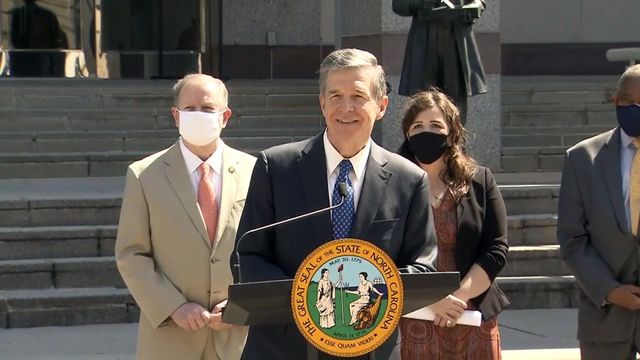Editorial: A rare scene that needs to be more common
Thursday, March 11, 2021 -- Wednesday's moment of conciliation and collegiality came after bitter confrontation, a failed veto override and name-calling - all utterly unnecessary and not constructive. The resolution reached was recognition that, all along, legislators and the governor had more in common on the issue of reopening classrooms than not.
Posted — UpdatedIt was a rare sight. It should have been and needs to be more common.
On the steps of the State Museum of History – not so coincidentally located midway between the governor’s office in the State Capitol and the House and Senate chambers in the Legislative Building – Democratic Gov. Roy Cooper and the Republican leaders of the General Assembly ended their confrontation over getting North Carolina children and their teachers back into classrooms.
The resolution reached was recognition that, all along, legislators and the governor had more in common on the issue of reopening classrooms than not. Meeting, hashing out the differences, would produce a law that met the shared objectives of moving toward getting schools open and making sure it was done in a healthy and safe manner.
Local administrators could rapidly respond to COVID19 outbreaks and could if necessary, close schools. The governor would have the authority to close or modify school operations of individual schools and school districts. He won’t have the authority, even in a declared emergency, to order statewide school closures.
The State Department of Public Instruction will contract with the ABC Science Collaborative – a project of the Duke University School of Medicine – to provide metrics for school safety and collect information from schools. The collaborative will report monthly to the legislature, Department of Public Instruction and the governor.
By the time the requirement for in-class instruction starts, teachers and other school personnel will have had better than a month to get COVID-19 vaccines.
The frustration – particularly for those who work in schools, have children in schools or attend them – is that this was not an elusive compromise. It has been obvious and simply required good will and making a priority of doing what is best for North Carolina.
Too often that most-critical concern has been subjugated to partisan political posturing and ideological grandstanding.
While we are not naively optimistic, we still don’t abandon hope that the culmination of the tussle over the back-to-classroom legislation will be instructive.
Good politics is about making what is best for the state THE priority. It is not crushing the governor or partisan opposition. It isn’t notching a political victory on some imaginary scoreboard of one-upmanship.
This effort should shine a path to more constructive and collaborative efforts -- not be an isolated exception.
Copyright 2024 by Capitol Broadcasting Company. All rights reserved. This material may not be published, broadcast, rewritten or redistributed.





